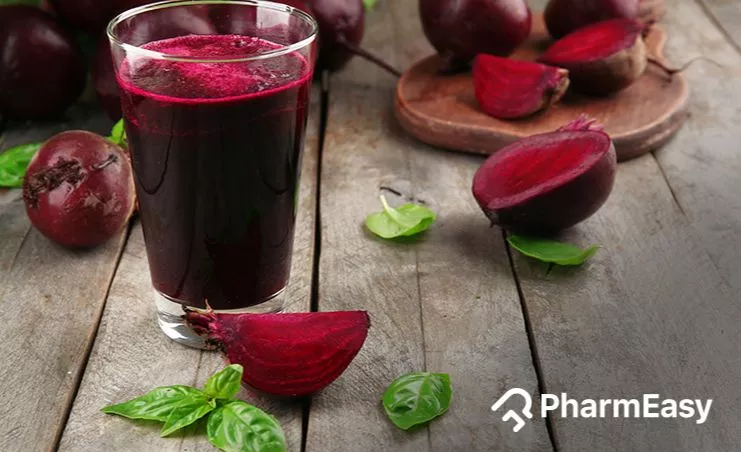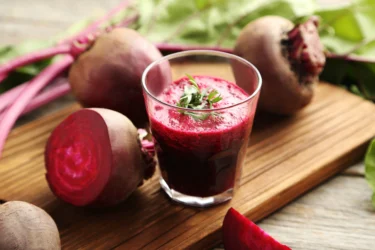Beetroot Juice: Uses, Benefits, Side Effects and More!
By Dr Rajeev Singh +2 more

Get,

to manage your symptom
Get your,


4 Cr+ families
benefitted

OTP sent to 9988776655



You’ve successfully subscribed to receive
doctor-approved tips on
Whatsapp

Get ready to feel your best.

Hi There,
Download the PharmEasy App now!!


Register to Avail the Offer
Send OTPBy continuing, you agree with our Privacy Policy and Terms and Conditions

Hi There,
Sign up on PharmEasy now!!
Trusted by 4 crore+ families

OTP sent to 9988776655



You have unlocked 25% off on medicines




Code: NU25
By Dr Rajeev Singh +2 more
Table of Contents
Beetroot is scientifically known as Beta vulgaris. It belongs to the family Betoideae. It is widely cultivated in Europe, America, and Asia. Beetroot juice is a traditional remedy; it has multiple health benefits, it is thus considered a functional food. Beetroot is commonly known as red beet, table beet or garden beet1.

The Beetroot juice has a high amount of nutrients that are contributed by bioactive compounds such as polyphenols, betalain, folates, inorganic nitrates, vitamins, and minerals1,2.
Beetroot juice might have different biological activities that may help in managing various diseases1. The properties of beetroot juice are given as follows:
Did You Know?
Beetroot might be regarded as a functional food; beetroot juice might have the potential to help against many conditions and chronic diseases1. Some of the potential uses of beetroot juice are described as follows.

Beetroot juice contains betalain, a bioactive compound that may show potential antioxidant activity. Lab studies on cancer cells showed that beetroot juice may be beneficial for people with cervical, ovarian, and bladder cancer cells. It might also help reduce the risk of certain cancers. However, extensive research is required to know about the exact mechanisms and safety of using beetroot juice for cancer patients.

The potential health uses of beetroot juice for weight loss might be due to the presence of red betalain pigment, which might show potent antioxidant activity. Various studies have shown that beetroot juice might help manage body weight. The low calories of the green leaves and stems of beetroot might be used by an Ayurvedic physician for the preparation of formulations that might help obesity and aid weight management. Therefore, an Ayurvedic physician should be consulted for the use of beetroot juice for health effects.

Variations in blood pressure cause various heart diseases such as heart attack and stroke. Beetroot juice might prove to be a good addition to your daily routine for heart health as it contains a high amount of nitrates. Nitrates might be helpful for people with high blood pressure (hypertension). The dietary nitrate of beetroot juice gets converted to nitric oxide, a potential vasodilator that might affect blood pressure by enlarging the size of the blood vessels; thus, beetroot juice might be a potent bioactive agent to help with high blood pressure3. However, more research is required to be sure of the above-mentioned effects of beetroot juice on blood pressure.

Beetroot juice might help with elevated blood glucose. A recent study7 has reported that it may significantly help with blood glucose levels by increasing insulin response. The possible mechanism may be due to the bioactive compounds such as polyphenols, nitrate and flavonoids. The polyphenol-rich beetroot juice may be responsible for the late rise in glucose and insulin responses after every meal4. However, more research is needed to quantify such effects and state them as concrete facts.

Though there are studies that show the benefits of beetroot juice in various conditions, these are insufficient, and there is a need for further studies to establish the true extent of the benefits of beetroot juice on human health.
Beetroot juice may help improve exercise performance by reducing exercise energy consumption. You can enjoy a glass of fresh beetroot juice before or after your exercise routine to keep you energised and refreshed6.
Dr. Siddharth Gupta, B.A.M.S, M.D (Ayu)
The uses of beetroot juice are given as follows1:
One should always consider an Ayurvedic physician before consuming beetroot juice in large volumes for its health benefits. A glass of beetroot juice is safe, though.
You must consult a qualified doctor before taking any herbal supplements. Do not discontinue or replace an ongoing treatment of modern medicine with an ayurvedic/herbal preparation without consulting a qualified doctor.
Beetroot has high amounts of antioxidants that may help protect the liver and kidneys from oxidative stress and keep any damage at bay6.
Dr. Rajeev Singh, BAMS
Beetroot juice causes the following side effects:
However, these side effects should be reported to your Ayurvedic physician, and immediate management is recommended. Therefore, it is advised that you take utmost care and consult an Ayurvedic physician before using beetroot juice.
Also Read: Aloe Vera Juice: Uses, Benefits, Side Effects and More!
The following general precautions should be taken while drinking beetroot juice:
Kindly note that beetroot juice should not be used as a medicine or in excess quantities without the consultation of an Ayurvedic physician. Kindly do not self-medicate, substitute, or discontinue any kind of treatment on your own, as it might have unknown effects.
Also Read: Wheatgrass Juice: Uses, Benefits, Side Effects and More!
Beetroot juice may interact with medications, causing undesirable reactions during the metabolism process; e.g., beetroot juice interaction may increase the activity of specific drugs1,4.
You should consult your doctor and tell them about the medicines that you are on. Please do not make any changes on your own.
Also Read: Cucumber (Kheera) Juice: Uses, Benefits, Side Effects and More!
Beetroot juice contains dietary fibre that helps remove digestive waste through the intestines, thereby proving beneficial for people with constipation1. However, consuming chopped beetroot added to salad can be more beneficial in such cases. More research is required to be entirely sure about the effects of beetroot juice on constipation.
Beetroot juice contains essential components such as vitamins, minerals, phenolic compounds, ascorbic acids, carotenoids, nitrate and betalain pigments1.
One of the potential uses of drinking beetroot juice is that it might help with macular degeneration (loss of vision) in some cases. The presence of carotenoids is considered beneficial for the eyes. However, there is a need for more studies to be sure about the use of beetroot juice for better vision.
Yes, beetroot juice may help boost energy. Beetroot juice contains bioactive compounds such as vitamin C, fibre, and vital minerals such as potassium and manganese that are helpful for healthy nerves and the functioning of muscles. They may also reduce the usage of energy (ATP); in this way, beetroot juice might boost our energy1.
The potential effect of daily drinking of beetroot juice is that it may help the sports performance in recreationally active men, as it may help time to exhaustion, maximal sprint performance and high-intensity intermittent performance3. However, there isn’t sufficient research to claim such effects. Therefore, there is a need for more research to do so.
1. Ceclu L, Nistor OV. Red Beetroot: Composition and Health Effects – A Review. J Nutr Med Diet Care. 2020 July 18;6(43):1-9. Available from: https://pdfs.semanticscholar.org/892c/b3a68c3c4118a8cae8692813c4946e6c17a2.pdf
2. US Department of Agriculture [Internet]. Beetroot Juice, Beetroot; 2022 Jan 4 [cited 2022 Jun 9]. Available from: https://fdc.nal.usda.gov/fdc-app.html#/food-details/2254753/nutrients
3. Zamani H, de Joode MEJR, Hossein IJ, Henckens NFT, Guggeis MA, Berends JE, et al. The benefits and risks of beetroot juice consumption: a systematic review. Crit Rev Food Sci Nutr. 2021;61(5):788-804. Available from: https://www.tandfonline.com/doi/pdf/10.1080/10408398.2020.1746629?needAccess=true
4. Mirmiran P, Houshialsadat Z, Gaeini Z, Bahadoran Z, Azizi F. Functional properties of beetroot (Beta vulgaris) in management of cardio-metabolic diseases. Nutr Metab (Lond). 2020 Jan 7;17:3. Available from: https://nutritionandmetabolism.biomedcentral.com/track/pdf/10.1186/s12986-019-0421-0.pdf
5. de Oliveira LCL, Genov IR, Cabral EDC, Mello YAMF, Mallozi MC, Solé D. Anaphylaxis to beetroot (Beta vulgaris): a case report. Clin Transl Allergy. 2011 Feb 19;1(Suppl 1):P51. Available from: https://www.ncbi.nlm.nih.gov/pmc/articles/PMC3354182/pdf/2045-7022-1-S1-P51.pdf
6. Chen L, Zhu Y, Hu Z, Wu S, Jin C. Beetroot as a functional food with huge health benefits: antioxidant, antitumor, physical function, and chronic metabolomics activity. Food Sci Nutr. 2021;9(11):6406-6420. doi:10.1002/fsn3.2577. Available from: https://pmc.ncbi.nlm.nih.gov/articles/PMC8565237/
7. Karimzadeh L, Sohrab G, Hedayati M, Ebrahimof S, Emami G, Razavion T. Effects of concentrated beetroot juice consumption on glycemic control, blood pressure, and lipid profile in type 2 diabetes patients: randomized clinical trial study. Ir J Med Sci. 2023 Jun;192(3):1143-1153. doi:10.1007/s11845-022-03090-y. Available from: https://pmc.ncbi.nlm.nih.gov/articles/PMC9307292/
Disclaimer: The information provided here is for educational/awareness purposes only and is not intended to be a substitute for medical treatment by a healthcare professional and should not be relied upon to diagnose or treat any medical condition. The reader should consult a registered medical practitioner to determine the appropriateness of the information and before consuming any medication. PharmEasy does not provide any guarantee or warranty (express or implied) regarding the accuracy, adequacy, completeness, legality, reliability or usefulness of the information; and disclaims any liability arising thereof.
Links and product recommendations in the information provided here are advertisements of third-party products available on the website. PharmEasy does not make any representation on the accuracy or suitability of such products/services. Advertisements do not influence the editorial decisions or content. The information in this blog is subject to change without notice. The authors and administrators reserve the right to modify, add, or remove content without notification. It is your responsibility to review this disclaimer regularly for any changes.
Comments

Leave your comment...
You may also like
Comments